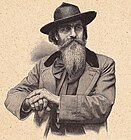 Anarchism is a political philosophy and movement that is against all forms of authority and seeks to abolish the institutions it claims maintain unnecessary coercion and hierarchy, typically including the state and capitalism. Anarchism advocates for the replacement of the state with stateless societies and voluntary free associations. As a historically left-wing movement, this reading of anarchism is placed on the farthest left of the political spectrum, usually described as the libertarian wing of the socialist movement (libertarian socialism). Although traces of anarchist ideas are found all throughout history, modern anarchism emerged from the Enlightenment. During the latter half of the 19th and the first decades of the 20th century, the anarchist movement flourished in most parts of the world and had a significant role in workers' struggles for emancipation. Various anarchist schools of thought formed during this period. Anarchists have taken part in several revolutions, most notably in the Paris Commune, the Russian Civil War and the Spanish Civil War, whose end marked the end of the classical era of anarchism. In the last decades of the 20th and into the 21st century, the anarchist movement has been resurgent once more, growing in popularity and influence within anti-capitalist, anti-war and anti-globalisation movements. (Full article...)
Selected article
Anarchism as a social movement in Cuba held great influence with the working classes during the 19th and early 20th century. The movement was particularly strong following the abolition of slavery in 1886, until it was disected first in 1925 by President Gerardo Machado, and finally by Fidel Castro's Marxist government following the Cuban Revolution in the late 1950s. Cuban anarchism mainly took the form of Bakuninist anarcho-collectivism and, later, anarcho-syndicalism. The Latin American labor and by extension the Cuban labor movement itself was at first more influenced by anarchism than Marxism. (read more...)
Selected image Members of the Spanish anarcho-syndicalist union the Confederación Nacional del Trabajo (National Confederation of Labour) taking part in strike action at Spanish supermarket chain Mercadona on 13 June 2006. July of 2006 marked the 70th anniversary of the Spanish Revolution, and in commemoration the CNT and FAI organized commemorative celebrations. Did you know?
Selected quoteAnniversaries for July 4
Relevant listsCategoriesRelated portalsParent portals Socio-political portals Related WikiProjectsParent projects
Economics · Philosophy Socio-political projects Anarchism TopicsThings you can doThank you for your interest in improving the coverage of anarchism on Wikipedia!
Related WikimediaThe following Wikimedia Foundation sister projects provide more on this subject:
Discover Wikipedia using portals
|
How Can We Help?


























Recent Comments